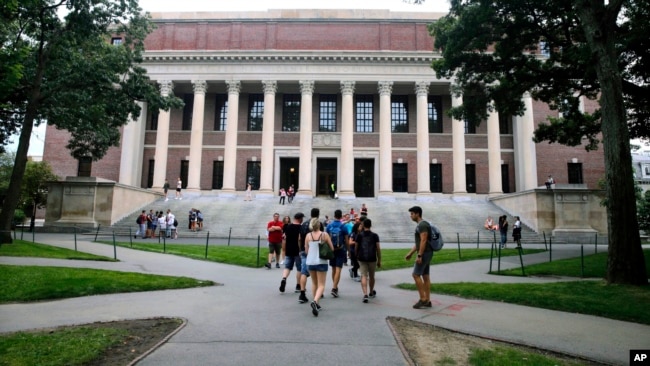コロナは世界をいっぺんさせました。
新生活スタイル、とやら。
それが、学生たちにも及ぼうとしています。
留学は授業の学びだけではありません。キャンパスライフそのものが留学生活の魅力です。
オンライン化が、仇になるとは。
VOAから。
- 新ルール:外国人留学生は、授業がオンライン化された場合、米国から出国しなければならない
- 原文 New Rules: Foreign Students Must Leave US if Classes Go Online
新ルール:外国人留学生は、授業がオンライン化された場合、米国から出国しなければならない
New Rules: Foreign Students Must Leave US if Classes Go Online
今年後半にオンラインのみの授業を提供する予定の学校がある場合、留学生は米国を離れるか、大学を変更することを余儀なくされることになります。
この要件は、米国移民税関執行局(ICE)による新しいガイダンスの一環です。連邦政府機関は月曜日にこの措置を発表した。これらの措置は、若年成人の間でCOVID-19が蔓延していることへの懸念が高まる中、大学が再開するための追加圧力となっているのです。
大学は、ハーバード大学を含むいくつかの学校が、今秋のすべての授業をオンラインで提供すると発表したのと同じ日に、この規則を知りました。
ドナルド・トランプ米大統領は、学校やカレッジに対し、できるだけ早く対面授業を再開するよう促しています。ガイダンスが発表された直後、トランプ氏はツイッターに、学校はこの秋に再開しなければならないと書き込んだのです。彼は、民主党の議員達が学校を閉鎖したままにしたいと思っていると言います。"健康上の理由ではなく、政治的な理由で"
米国の移民当局は、パンデミックの初期に、留学生のためのいくつかの要件を中断しました。しかし、大学は秋に何が起こるかについてのガイダンスを待っていたのです。ICE は月曜日のに変更の学校に伝え、公式規則はすぐに利用できるだろうと言っています。
規則の下では、留学生は、クラスの少なくともいくつかを対面授業で取らなければなりません。新しいビザは、完全にオンラインである学校やプログラムの学生には与えられません。対面授業とオンライン授業が混在している大学でも、留学生はすべての授業をオンラインで受講することが禁じられます。
この規則は、何千人もの留学生にとって喫緊の問題となっています。この春、コロナウイルスが学校をオンラインへ移行することを余儀なくされた後、多くの人がに米国に閉じ込められてしまいました。
オンラインにとどまっている学校に通う留学生は、”出国するか、対面授業のある学校に転校するなど、他の手段を取らなければならない”と ICE は述べています。
大学学長を代表するアメリカ教育評議会は、このガイドラインを "恐ろしい "と評しました。
留学生は、学校で感染が発生し、秋学期が始まった後に完全にオンライン化された場合、米国を離れなければならない可能性があります。学生がそのような状況になり、自国からの旅行制限に直面した場合に何が起こるかは明らかではないと, 評議会の上級副会長であるテリー・ハートル氏は言います。
国際教育グループNAFSAもまた、この規則を批判しました。同団体は、学校関係者には、それぞれのキャンパスに適した決定を下す権限が与えられるべきだと述べています。ガイダンスは、"留学生に有害であり、彼らの健康と幸福と高等教育のコミュニティ全体を危険にさらす "と述べました。
2019年9月30日に終了した12ヶ月間に40万人近くの外国人が学生ビザを取得しました。その数は4年前と比べて40%以上減少しています。学校管理者は、ビザ処理の遅れを部分的に非難しています。
米国全土のカレッジや大学は、すでにこの秋に留学生数の急激な減少を予想していました。しかし、すべての留学生を失うことは、一部の学校にとっては悲惨なことになりかねません。多くの学校は留学生からの授業料の支払いに大きく依存しており、彼らはしばしばより高い料金を支払っています。
トランプ氏の批判者たちは、この新ガイダンスを鋭く批判しました。バーモント州のバーニー・サンダース上院議員(無党派)は、"このホワイトハウスの残酷さは限界を知らない "と述べています。
"留学生は選択を迫られている: 直接授業に行くか、国外追放されるか、命を賭して" サンダースはツイッターに書き込んでいます。
多くの大学はこの秋、少なくともいくつかの授業を対面で提供する予定だと述べていますが、一部の大学はそれがあまりにも危険だと言っています。先週、南カリフォルニア大学は、学生をキャンパスに呼び寄せる計画を変更し、その代わりに授業はほとんどオンラインで行われると関係者は述べています。ハーバード大学は月曜日に、1年生のみをキャンパスに招待し、その敷地内で生活することを計画していると発表しました。しかし、授業はオンラインで行われる予定です。
原文 New Rules: Foreign Students Must Leave US if Classes Go Online
 In this Aug. 13, 2019 file photo, students walk near the Widener Library in Harvard Yard at Harvard University in Cambridge, Mass. The Ivy League school announced Monday, July 6, 2020, that as the coronavirus pandemic continues its freshman class will be
In this Aug. 13, 2019 file photo, students walk near the Widener Library in Harvard Yard at Harvard University in Cambridge, Mass. The Ivy League school announced Monday, July 6, 2020, that as the coronavirus pandemic continues its freshman class will be
International students will be forced to leave the United States or change colleges if their school plans to offer online-only classes later this year.
The requirement is part of new guidance from U.S. Immigration and Customs Enforcement, or ICE. The federal agency announced the measures on Monday. They provide additional pressure for universities to reopen as concern grows about the spread of COVID-19 among young adults.
Colleges learned of the rules the same day that some schools, including Harvard University, announced that all classes this autumn would be offered online.
U.S. President Donald Trump has urged schools and colleges to restart in-person classes as soon as possible. Soon after the guidance was released, Trump wrote on Twitter that schools must reopen this fall. He said Democratic Party lawmakers want to keep schools closed “for political reasons, not for health reasons.”
U.S. immigration officials suspended some requirements for international students early in the pandemic. But colleges were waiting for guidance on what would happen in the fall. ICE told schools of the changes Monday, and said that official rules would be available soon.
Under the rules, international students must take at least some of their classes in person. New visas will not be given to students at schools or programs that are fully online. Even at colleges offering a mix of in-person and online classes, international students will be barred from taking all of their classes online.
The rules create an urgent problem for thousands of international students. Many became trapped in the United States last spring after the coronavirus forced their schools to move online.
International students who attend schools that are staying online must “depart the country or take other measures, such as transferring to a school with in-person instruction,” ICE said.
The American Council on Education, which represents university presidents, described the guidelines as “horrifying.”
An international student may have to leave the U.S. if their school experiences an outbreak and goes fully online after the fall term begins. It is not clear what would happen if a student was in such a situation but faced travel restrictions from their home country, said Terry Hartle, the council’s senior vice president.
The international education group NAFSA also criticized the rules. It said school officials should be given the power to make decisions that are right for their own campuses. It said the guidance “is harmful to international students and puts their health and well-being and that of the entire higher education community at risk.”
Nearly 400,000 foreigners received student visas in the 12-month period that ended on September 30, 2019. That number is down more than 40 percent from four years earlier. School administrations partly blame visa processing delays.
Colleges and universities across the U.S. were already expecting a sharp drop in international student numbers this fall. But losing all international students could be disastrous for some schools. Many depend heavily on tuition payments from international students, who often pay higher rates.
Critics of Trump sharply criticized the new guidance. Vermont Senator Bernie Sanders, an Independent, said the “cruelty of this White House knows no bounds.”
“Foreign students are being threatened with a choice: risk your life going to class in-person or get deported,” Sanders wrote on Twitter.
Many colleges have said they plan to offer at least some classes in person this fall, but some say it is too risky. Last week, the University of Southern California changed its plan to bring students to campus, with officials saying classes will instead be offered mostly online. On Monday, Harvard said it plans to invite only first-year students to live on its grounds. Its classes, however, will stay online.
______________________________________________________________
Words in This Story
fall - n. the season between summer and winter : the season when leaves fall from trees
pandemic - n. an occurrence in which a disease spreads very quickly and affects a large number of people over a wide area or throughout the world
depart - v. to leave a place especially to start a journey
transfer - v. to move (someone or something) from one place to another
horrifying - v. to cause (someone) to feel horror or shock : to greatly upset and shock (someone)
outbreak - n. a sudden start or increase of fighting or disease
campus - n. the area and buildings around a university, college, school, etc.
tuition - n. money that is paid to a school for the right to study there
cruelty - n. a desire to cause others to suffer : the quality or state of being cruel
know no bounds - expression. to have no limits